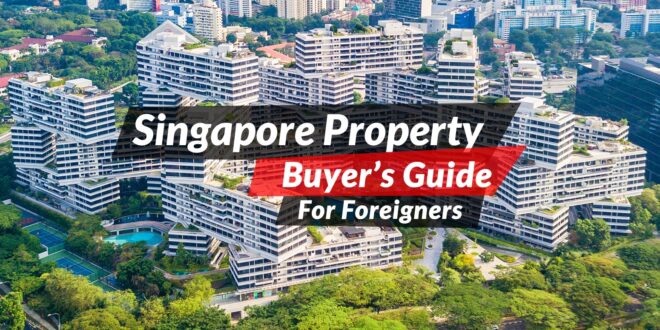Singapore, a globally recognized hub for business and leisure, offers a dynamic real estate market that attracts foreign investors and residents alike. Buying an apartment in this city-state is an attractive proposition for many, but it comes with its unique set of challenges and regulations. This guide delves into the essential aspects of purchasing property in Singapore as a foreigner, shedding light on legalities, property types, financial considerations, and more. Whether you’re looking for an investment or a new home, understanding the Singaporean property landscape is key to making an informed and successful purchase.
Table of Contents
Understand Legal Eligibility

In Singapore, the legal eligibility for foreigners to purchase residential properties is defined by the Residential Property Act. While non-residents are generally allowed to buy condominium units and other private apartments without prior approval, the acquisition of landed properties and HDB flats (public housing) is restricted. Landed properties in particular, often require approval from the Singapore Land Authority, and the process can be quite stringent. Understanding these legalities is crucial; it’s not just about whether you can buy, but what you can buy. As a foreign buyer, familiarizing yourself with these regulations will help streamline your property search and avoid any legal pitfalls.
Types of Residential Properties
The Singaporean property market offers a wide range of residential options, catering to different preferences and budgets. The most common types include HDB flats, condominiums, executive condominiums, and landed houses. HDB flats, primarily intended for Singaporean citizens and Permanent Residents, are less accessible to foreigners. Condominiums and private apartments, on the other hand, are popular among foreign buyers due to their accessibility, modern amenities, and security features. Landed properties, including bungalows and terrace houses, offer more space and privacy but come with stricter ownership rules for foreigners. Each property type has its unique characteristics, advantages, and regulations, making it essential to understand which aligns best with your needs and eligibility as a foreign buyer. One of the best options out there, regardless of what you’re looking for, just might be Hillhaven.
Budget Considerations
Establishing a realistic budget is one of the most crucial steps in the property buying process in Singapore. Property prices in Singapore can be quite high, and they vary greatly depending on the type of property, location, and amenities. Apart from the purchase price, additional costs such as Buyer’s Stamp Duty (BSD) and Additional Buyer’s Stamp Duty (ABSD) for foreigners, which can significantly increase the overall cost, must be factored in. Maintenance fees, renovation costs, and future property taxes also add to the financial considerations. It’s advisable for foreign buyers to have a clear understanding of their financial capacity and consider all potential expenses to avoid any surprises during the purchase process.
Financing Options

Foreigners looking to buy property in Singapore have various financing options, primarily through bank loans. However, it’s important to note that the loan-to-value (LTV) ratio for non-residents might be lower compared to locals, meaning you may need a higher down payment. Additionally, banks conduct thorough assessments of your income, credit history, and other financial commitments. Interest rates and loan terms can vary, so it’s advisable to shop around and compare offers from different financial institutions. Understanding these financing nuances and preparing your finances accordingly is crucial for a smooth property acquisition.
Property Taxes and Stamp Duties
Understanding property taxes and stamp duties is essential for foreign buyers in Singapore. The Buyer’s Stamp Duty (BSD) applies to all property purchases, while Additional Buyer’s Stamp Duty (ABSD) is significantly higher for foreigners, currently standing at 20% of the property value. There’s also the annual property tax, calculated based on the property’s value. These taxes can represent a substantial part of your investment, so it’s crucial to account for them in your budget. Always stay informed about current rates as they can change based on government policies.
Restrictions on Ownership
Singapore imposes certain restrictions on foreign property ownership to maintain a balanced housing market. As a non-resident, you’re generally restricted to purchasing non-landed residential properties like condominiums or private apartments. Landed properties are off-limits unless you obtain special approval from the Land Dealings Approval Unit (LDAU). Additionally, purchasing public housing (HDB flats) is not an option for foreigners, as these are reserved for Singapore citizens and permanent residents. It’s vital to be aware of these restrictions to focus your property search effectively.
Engaging a Real Estate Agent

Navigating the Singapore property market can be complex for foreigners. Engaging a qualified real estate agent can be immensely beneficial. They provide valuable insights into the market, help identify properties that meet your requirements and guide you through the legal and administrative processes. A good agent can also assist in negotiating prices and terms. Ensure your agent is registered with the Council for Estate Agencies (CEA) in Singapore to guarantee professional and ethical service.
Due Diligence and Property Inspection
Before finalizing any property purchase, conducting thorough due diligence and a comprehensive property inspection is crucial. This includes verifying the property’s legal status, ensuring there are no outstanding debts or legal issues attached to it, and assessing the property’s condition. Hiring professional inspectors to evaluate the property can uncover potential issues that might not be obvious during a casual walkthrough. This step is vital to ensure that your investment is sound and to avoid any costly surprises in the future.
Purchase Process and Documentation
The process of buying a property in Singapore involves several steps. It starts with securing an Option to Purchase (OTP) from the seller, followed by paying a nominal option fee. Once the OTP is exercised, you’ll need to pay the stamp duties and the down payment. The next steps involve signing the Sales and Purchase Agreement and settling the remaining payment, usually through a bank loan or CPF funds. The entire process requires various documents, including your passport, employment pass (if applicable), and bank statements. Understanding and preparing for each step ensures a smooth transaction.
Additional Costs and Fees

Apart from the purchase price, foreign buyers should be aware of additional costs and fees. These include legal fees, agent commissions, loan application fees, and mortgage stamp duties. Maintenance fees for condominiums and other private estates can also add up. It’s important to budget for these expenses to have a clear picture of the total investment required. Ensuring that you have a comprehensive understanding of all the costs involved will help you manage your finances more effectively.
Conclusion and Tips
Buying an apartment in Singapore as a foreigner is a significant investment and a complex process that requires careful planning and understanding of the local real estate market. Start by ensuring your legal eligibility, understanding the types of properties available, and setting a realistic budget. Explore financing options and be mindful of the taxes, duties, and additional costs. Engage a real estate professional, conduct due diligence, and familiarize yourself with the purchase process and documentation. By being well-informed and prepared, you can navigate the Singapore property market with confidence and make a successful investment.
 World Magazine 2024
World Magazine 2024






